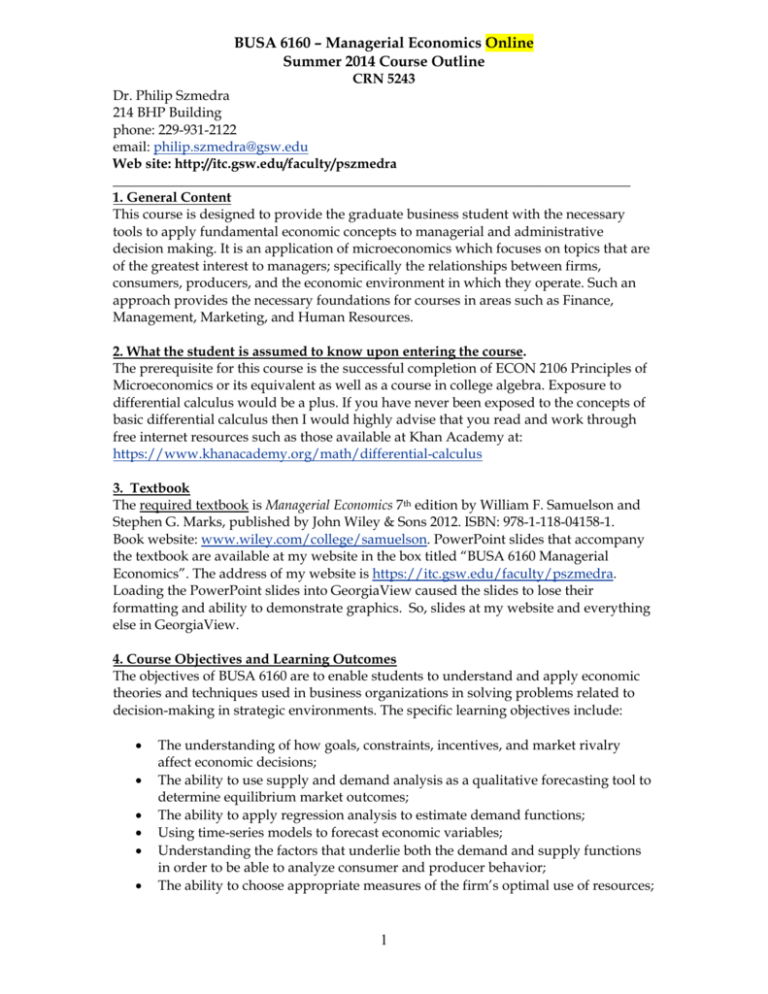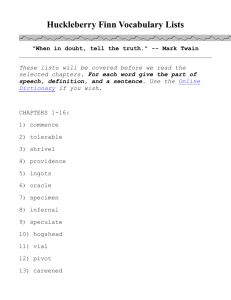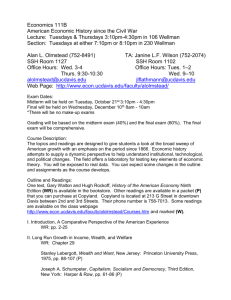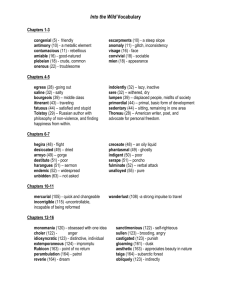ECON 6XXX – Managerial Economics
advertisement

BUSA 6160 – Managerial Economics Online Summer 2014 Course Outline CRN 5243 Dr. Philip Szmedra 214 BHP Building phone: 229-931-2122 email: philip.szmedra@gsw.edu Web site: http://itc.gsw.edu/faculty/pszmedra ___________________________________________________________________________ 1. General Content This course is designed to provide the graduate business student with the necessary tools to apply fundamental economic concepts to managerial and administrative decision making. It is an application of microeconomics which focuses on topics that are of the greatest interest to managers; specifically the relationships between firms, consumers, producers, and the economic environment in which they operate. Such an approach provides the necessary foundations for courses in areas such as Finance, Management, Marketing, and Human Resources. 2. What the student is assumed to know upon entering the course. The prerequisite for this course is the successful completion of ECON 2106 Principles of Microeconomics or its equivalent as well as a course in college algebra. Exposure to differential calculus would be a plus. If you have never been exposed to the concepts of basic differential calculus then I would highly advise that you read and work through free internet resources such as those available at Khan Academy at: https://www.khanacademy.org/math/differential-calculus 3. Textbook The required textbook is Managerial Economics 7th edition by William F. Samuelson and Stephen G. Marks, published by John Wiley & Sons 2012. ISBN: 978-1-118-04158-1. Book website: www.wiley.com/college/samuelson. PowerPoint slides that accompany the textbook are available at my website in the box titled “BUSA 6160 Managerial Economics”. The address of my website is https://itc.gsw.edu/faculty/pszmedra. Loading the PowerPoint slides into GeorgiaView caused the slides to lose their formatting and ability to demonstrate graphics. So, slides at my website and everything else in GeorgiaView. 4. Course Objectives and Learning Outcomes The objectives of BUSA 6160 are to enable students to understand and apply economic theories and techniques used in business organizations in solving problems related to decision-making in strategic environments. The specific learning objectives include: • • • • • • The understanding of how goals, constraints, incentives, and market rivalry affect economic decisions; The ability to use supply and demand analysis as a qualitative forecasting tool to determine equilibrium market outcomes; The ability to apply regression analysis to estimate demand functions; Using time-series models to forecast economic variables; Understanding the factors that underlie both the demand and supply functions in order to be able to analyze consumer and producer behavior; The ability to choose appropriate measures of the firm’s optimal use of resources; 1 • • • • • • • • Estimating production functions in the short and long run; Assessing the multi-plant and multi-product managerial decisions; Determining relevant costs of production to determine the effective scale and scope of operations; Understanding the structure-conduct-performance paradigm and how the nature of industry is affected by market structure; The ability to identify conditions under which a firm operates in monopolistic, oligopolistic, and monopolistically competitive markets to determine optimal pricing, output, and profit conditions; Decision-making under uncertainty; The issue of asymmetric information and organizational design; Understanding the role government can play when markets fail. 5. Course Content 1. Introduction to Economic Decision Making • Six steps to decision making • Private and public decisions: an economic view Reading: Samuelson and Marks (S&M) chapter 1 2. Decisions within Firms • Optimal Decisions using Marginal Analysis a. Marginal revenue and Marginal Cost b. Profit Maximization c. Sensitivity Analysis • Demand Analysis and Optimal Pricing a. Determinants of Demand b. Elasticity of Demand c. Demand Analysis • Estimating and Forecasting Demand a. Data Collection b. Regression Analysis c. Forecasting • Production a. Production with One Variable Input b. Production in the Long Run c. Measuring Production Functions d. Multiple Plants/Multiple Products • Cost Analysis a. Relevant Costs b. The Cost of Production c. Returns to Scale and Scope d. Optimal Decision Making Readings: S&M chapters 2, 3, 4, 5, 6. 3. Competing within Markets • Perfect Competition a. The Basics of Supply and Demand 2 • • • • b. Competitive Equilibrium c. Market Efficiency d. International Trade Monopoly a. Pure Monopoly b. Perfect Competition versus Pure Monopoly c. Monopolistic Competition Oligopoly a. Quantity Competition b. Price Competition c. Other Competitive Dimensions Game Theory and Competitive Strategy a. Competitive Situations b. Competitive Strategy Regulation, Public Goods, and Benefit-Cost Analysis a. Market Failure and Regulation b. Market Failure Due to Monopoly c. Externalities d. Imperfect Information e. Benefit-Cost Analysis and the Provision of Public Goods f. Public Goods g. B/C Analysis Basics h. Valuing Benefits and Costs Readings: S&M chapters 7, 8, 9, 10, 11. 4. Decision-Making Applications • Decision-Making Under Uncertainty a. Uncertainty, Probability, and Expected Value b. Decision Trees c. Sequential Decisions d. Risk Aversion • Asymmetric Information and Organizational Design a. Adverse selection b. Moral hazard c. The nature of the firm Readings: S&M chapters 12, 14. 3 6. Assessment A. Components Problem Sets Group project 2 Examinations 50% 10% 40% Problem Sets: Problem sets are assigned weekly and will be found in the “Problem Sets” folder in Desire2Learn. Each problem set will refer to the chapters in the textbook that the class is working on that week and consist of a series of multiple-choice and short answer questions some involving calculations. You may work together in study groups but each student must submit their own problem set. You will download and complete the week’s problem sets in Microsoft Word, make a copy of the problem sets for your files, and then attach the completed problem sets to an email to my regular GSW email address (philip.szmedra@gsw.edu) identifying yourself and the problem set numbers in the body of the text. Please do not send emails to my D2L email account. It is much more efficient for me to keep track of student work completed in my regular GSW email account. I encourage you to study in groups but it is important that you understand that the examinations are done individually and problem sets are submitted individually. Collaborating on an examination is a violation of academic honesty and will be dealt with severely as described below. Two problem sets will be assigned every week of the semester except the last, including those weeks in which an exam is scheduled. You will be assigned thirteen problem sets during the course of the semester. Please keep in mind that I do not offer other work for extra credit. Group Project: One of the characteristics of a successful manager, corporate executive, entrepreneur, and small business owner is the ability to work collaboratively. In keeping with this important notion of developing your collaborative skills you will be involved in group work on an analytic paper whose subject your group will choose from a list of topics provided by me. Depending on the size of the class the groups will consist of either two or three people. Group membership will also be chosen by me. Information about group membership and topic choice will be provided to you as soon as the final class roster is determined. The group project abstract as well as an outline of your proposed work is due to me by Wednesday June 25th. The final project output is due to me by Monday, July 21st. the final paper should be no longer than 15 pages, 1.5 line spacing, and Book Antigua font. Examinations: The two semester examinations will be comprised of both objective and subjective questions and will occur at the end of the fourth and eighth week of the summer term. The two examinations will occur on Sunday, June 28th and Thursday, July 24th during any three hour period that you select between 12:01AM and 11:59PM. You must make an appointment with ProctorU for the time you have selected to take the exam on the examination day. Because of the abbreviated summer session and the necessity of condensing the course, the first exam will occur on the same weekend in which problem sets are due. It will be useful to you to complete the problem sets during the week prior the scheduled exam. 4 I will advise ProctorU that students are allowed the textbook, their notes, and a calculator (no phone calculators) while taking the exam. You will not be allowed to browse the internet. Only the screen containing the exam will be allowed. No phones and no other individuals around you while taking the exam. The only legitimate reason for failing to take an on-line examination is illness. I will allow you to take a makeup exam only after presenting to me a medical doctor’s excuse explaining your illness or the illness of someone in your immediate family. I will not give a makeup exam under any other circumstance. ProctorU: Online course offerings at the School of Business Administration at GSW use a monitoring tool for examinations entitled ProctorU. This tool allows students to be monitored during an examination through the webcam of their laptops or PCs. For more information about ProctorU here is the link to their website: http://www.proctoru.com/ During the Summer 2014 semester both of our examinations will be monitored by ProctorU. Instructions on how to register with ProctorU will be provided in the “News” module of D2L as exam 1 approaches. Readings in Economics: I will frequently post articles from the popular press that I have read and that I feel will enhance your comprehension and understanding of contemporary economic issues. The readings will be relevant to your development as a business manager; to your intellectual development as a student of economics; and to your maturation as an informed citizen. I expect that the posted readings will spur you to contribute to the course discussion forum in D2L. I strongly encourage you to initiate and participate in online discussions. Managerial Economics and economics in general are topical, interesting, and important to your intellectual development as an informed citizen and a future manager or entrepreneur. Discussion participation will affect your final grade at the margin. What exactly does that mean? It means that if you are border line at the final grading, I will grade up if you have actively participated in online discussions. Active participation means that you have substantively contributed to more than half of the posted readings. 5 7. Class Work Schedule Due Date Saturday June 7th by 10PM Chapter Samuelson and Marks (S&M) Chapters 1&2 Problem Set Problem Set 1: Introduction to Economic Decision Making; PS2: Optimal Decisions using Marginal Analysis June 14th by 10PM S&M Chapters 3&4 June 21st by 10PM PS3: Demand Analysis and Optimal Pricing; PS4: Estimating and Forecasting Demand PS5: Production; PS6: Cost Analysis S&M Chapters 5&6 Group project abstract and outline is due. Wednesday June 25th June 28th by 10PM S&M Chapters 7&8 Sunday, June 29th by 12 :01AM to 11:59PM Saturday July 5th by 10PM July 12th by 10PM July 19th by 10PM Monday July 21st Thursday July 24th 12 :01AM to 11:59PM PS7: Perfect Competition; PS8: Monopoly Exam 1 Covering chapters 1-8 S&M Chapters 9&10 S&M Chapters 11&12 PS9: Oligopoly; PS10: Game Theory and Competitive Strategy PS11: Regulation, Public Goods, and Benefit-Cost Analysis; PS12: Decision-Making Under Uncertainty S&M Chapter 14 PS14: Asymmetric Information and Organizational Design Group project is due Exam 2 covering chapters 9, 10, 11, 12, 14 8. Academic Honesty: All students are expected to abide by the honesty and integrity standards set by the university. Any type of dishonest behaviour will be dealt with severely. The consequences of cheating on an examination, or plagiarism while completing a written assignment will be felt both at the class level through grade penalties and at the university level through disciplinary action. Specifically, one cheating infraction will cause you to receive and F in the course and your case forwarded to the university administration for disciplinary action. 9. Students with Disabilities: A student requesting classroom accommodations or modifications due to a documented disability must notify me within the first two weeks of the semester. If the student has not already done so, he or she must contact the Office of Disability Services to receive these accommodations and modifications. The Office of 6 Disability Services is located in room 101 of Sanford Hall. The phone number is 229-9312661. Dr. Philip Szmedra Professor of Economics School of Business Administration Georgia Southwestern State University Summer Semester 2014 7








